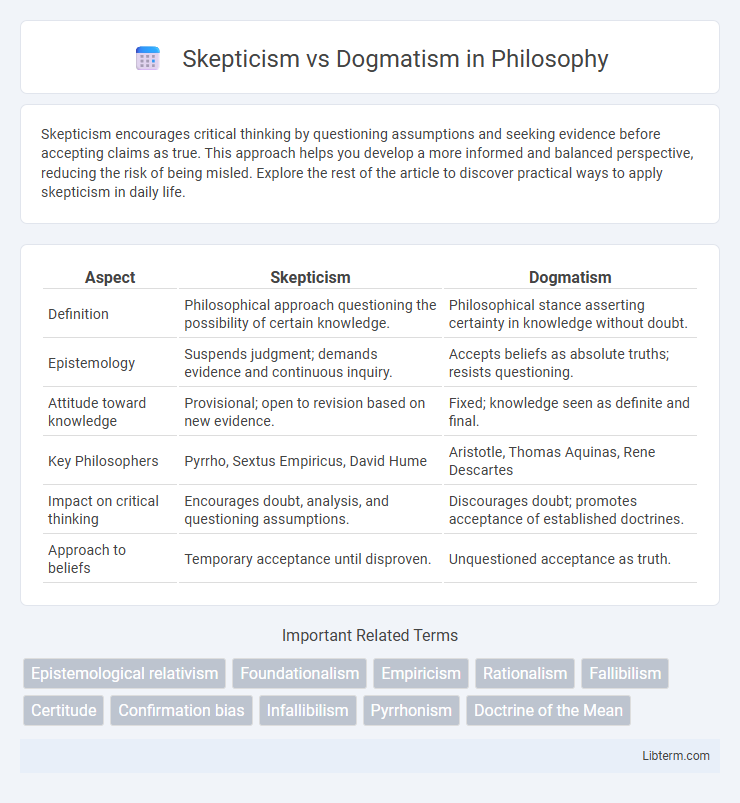Skepticism encourages critical thinking by questioning assumptions and seeking evidence before accepting claims as true. This approach helps you develop a more informed and balanced perspective, reducing the risk of being misled. Explore the rest of the article to discover practical ways to apply skepticism in daily life.
Table of Comparison
| Aspect | Skepticism | Dogmatism |
|---|---|---|
| Definition | Philosophical approach questioning the possibility of certain knowledge. | Philosophical stance asserting certainty in knowledge without doubt. |
| Epistemology | Suspends judgment; demands evidence and continuous inquiry. | Accepts beliefs as absolute truths; resists questioning. |
| Attitude toward knowledge | Provisional; open to revision based on new evidence. | Fixed; knowledge seen as definite and final. |
| Key Philosophers | Pyrrho, Sextus Empiricus, David Hume | Aristotle, Thomas Aquinas, Rene Descartes |
| Impact on critical thinking | Encourages doubt, analysis, and questioning assumptions. | Discourages doubt; promotes acceptance of established doctrines. |
| Approach to beliefs | Temporary acceptance until disproven. | Unquestioned acceptance as truth. |
Understanding Skepticism and Dogmatism
Skepticism involves questioning beliefs and demanding evidence before accepting claims, fostering critical thinking and open inquiry. Dogmatism asserts beliefs as incontrovertibly true, often disregarding contradictory evidence and limiting intellectual flexibility. Understanding skepticism requires recognizing its role in promoting doubt and continuous evaluation, while dogmatism reflects rigid adherence to doctrines regardless of proof.
Historical Origins of Skepticism and Dogmatism
Skepticism originated in ancient Greece with philosophers like Pyrrho and Sextus Empiricus, who questioned the possibility of certain knowledge and emphasized withholding judgment. Dogmatism traces back to early philosophical schools such as Plato's Academy and Aristotle's Lyceum, which asserted definitive doctrines and upheld absolute truths. The historical contrast between skepticism's doubt and dogmatism's certainty shaped centuries of epistemological debates.
Core Principles of Skeptical Thinking
Skeptical thinking emphasizes questioning assumptions, demanding empirical evidence, and maintaining intellectual humility to avoid bias and error. It prioritizes critical analysis over acceptance, encouraging continuous inquiry rather than fixed beliefs. By fostering doubt and open-minded investigation, skepticism challenges dogmatism's rigid adherence to beliefs without sufficient proof.
Key Characteristics of Dogmatic Beliefs
Dogmatic beliefs are marked by unwavering certainty and resistance to contradictory evidence, often leading to closed-mindedness and inflexible thinking. These beliefs prioritize authority and tradition over empirical data or rational inquiry, limiting openness to alternative perspectives. Such rigidity can hinder critical thinking and adaptive learning, distinguishing dogmatism from the questioning nature of skepticism.
Skepticism vs Dogmatism: Main Differences
Skepticism emphasizes questioning beliefs and seeking evidence before accepting claims, promoting open-minded inquiry and intellectual humility. Dogmatism asserts beliefs with absolute certainty, often rejecting contradictory evidence or alternative perspectives. The main difference lies in skepticism's focus on doubt and critical examination, whereas dogmatism relies on unwavering conviction and resistance to change.
Psychological Factors Behind Skepticism and Dogmatism
Psychological factors behind skepticism often include a high tolerance for ambiguity, openness to new information, and critical thinking tendencies, which promote questioning of established beliefs. In contrast, dogmatism is linked to cognitive rigidity, low tolerance for uncertainty, and a need for cognitive closure, driving individuals to cling firmly to fixed beliefs. Emotional factors such as fear of the unknown and identity protection further reinforce dogmatic attitudes, while skepticism benefits from curiosity and cognitive flexibility.
Impacts on Science and Knowledge Acquisition
Skepticism fosters scientific progress by encouraging critical analysis, continuous questioning, and empirical verification, which prevents the acceptance of unverified claims and promotes robust knowledge acquisition. Dogmatism, by contrast, impedes scientific advancement by enforcing rigid beliefs and discouraging inquiry, leading to intellectual stagnation and resistance to new evidence. Consequently, skepticism amplifies innovation and adaptability in science, whereas dogmatism restricts intellectual growth and the evolution of knowledge.
Social and Cultural Implications
Skepticism fosters open dialogue and cultural adaptability by encouraging critical inquiry and questioning of established norms. In contrast, dogmatism often leads to social rigidity and cultural stagnation, as it imposes fixed beliefs that resist change and diversity. Societies embracing skepticism tend to cultivate innovation and tolerance, while dogmatic cultures may experience conflict and exclusion due to inflexible ideologies.
Challenges in Balancing Skepticism and Dogmatism
Balancing skepticism and dogmatism presents challenges as excessive skepticism can lead to paralysis by analysis, hindering decision-making and progress, while rigid dogmatism often results in closed-mindedness and resistance to new information. Effective navigation requires cultivating intellectual humility and openness to evidence while maintaining enough conviction to act decisively. This balance is critical in fields like science and philosophy, where neither extreme skepticism nor absolute dogmatism fosters productive inquiry or innovation.
Fostering Critical Thinking in a Polarized World
Skepticism encourages questioning assumptions and evaluating evidence, promoting open-mindedness and adaptability essential for critical thinking in a polarized world. Dogmatism, characterized by rigid beliefs and resistance to opposing views, hinders constructive dialogue and intellectual growth. Cultivating skepticism fosters empathy and nuanced understanding, empowering individuals to navigate complex societal debates effectively.
Skepticism Infographic

 libterm.com
libterm.com